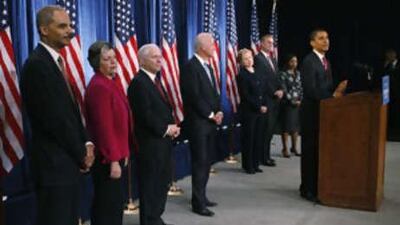As Barack Obama's cabinet and White House inner circle take shape, those who hoped for or feared a revolution in foreign policy have been confounded. In fact, it was the Bush Administration that was revolutionary in both the concepts they promoted and the policies they pursued. If anything, the pragmatism and centrism of the Obama team is counter-revolutionary, in that they represent a return to a more traditional realism-based foreign policy. Several additional observations can be made.
While some Obama appointments were announced individually, it is intriguing that those dealing with economic matters and national security were rolled out as "teams". Some observers saw this as an indication that despite the diversity within the two groups, they are being seen by the president-elect as teams on whose collective wisdom he will draw upon in developing policy.
In presenting the cast of "stars" who form the national security team, Mr Obama noted the global challenges they will confront, he praised their pragmatism and shared sense of purpose, and noted that while some had views that differed from his, he welcomed "vigorous debate within the White House". He then added: "But I understand I will be setting policy as president. I will be responsible for the vision this team carries out, and I expect them to implement that vision once decisions are made."
Clearly, the no-surprise/surprise member of the national security team is Hillary Clinton, Mr Obama's one-time rival. At issue here were not only the harsh words these two exchanged during their bitter primary campaign and the divergent views each had taken on several critical foreign policy issues, but the complicating factors presented by Bill Clinton.
Even news that the former president submitted to the Obama transition team's requirements that he place severe limits on his activities, and make public the donors to his library and foundation has not ended the controversy. In fact, this may only be the beginning, providing fodder for those inclined to give Mrs Clinton a difficult time during her confirmation hearing. While the lists have not yet been released, speculation abounds regarding rather substantial donations that could become controversial. The ranking member of the Senate Foreign Relations Committee, Republican Richard Lugar, has indicated his intention to ask tough questions. If this is the position taken by the relatively moderate Mr Lugar, what will be the stance of less temperate senators who might seek to draw early blood in an effort to weaken the Obama presidency?
Despite some unease in the Arab world about Mrs Clinton's attitudes towards the Middle East, she is, in fact, the consummate pragmatic politician. It should be recalled that it was she, not George W Bush, who was the first to publicly express support for a Palestinian state, creating some controversy in 1998 when she did so. Her dramatic shift began not when she started her run for the US Senate, but in response to controversy that erupted during a poorly planned Middle East trip at the start of her Senate run.
In an effort to demonstrate her leadership and ability to be balanced in her approach to the Israeli-Palestinian conflict, she travelled to the region for meetings with leaders on both sides. Her efforts were upended when the media got hold of comments that Suha Arafat, the wife of the former Palestinian president Yasser Arafat, had made in Mrs Clinton's presence, denouncing what she described as Israeli practices. It was in an effort to mollify the near-hysterical reaction back home that Mrs Clinton began her move towards advocating extremely hard-line pro-Israel positions.
Some who know Mrs Clinton have noted that despite her harsh rhetoric she remains committed to two states and believes, as her husband did, in the important roles that American Jews and Arab-Americans can play in fostering a better climate for Israeli-Palestinian peace. And it is intriguing to note that in his introduction of Mrs Clinton, Mr Obama cited three areas describing his ambitious foreign policy agenda: "Preventing the spread of nuclear weapons to Iran and North Korea ? seeking a lasting peace between Israel and the Palestinians ? and strengthening international institutions."
James Jones is also an unusual pick for Mr Obama. A former four-star general and former head of Nato in Europe, Mr Jones, like Mrs Clinton and Robert Gates, the secretary of defence, is not an Obama confidante. Early in his career, he worked with John McCain, the US senator, and most recently accepted an assignment from Condoleezza Rice, the secretary of state, to oversee the development of Palestinian security forces in the West Bank.
He created some controversy in Israel over a report he issued to the White House that, according to the Israeli newspaper Ha'aretz, criticises Israel's role in impeding the development of Palestinian forces. According to the paper, the report is "extremely critical ? scathing ? makes Israel look very bad". The report has not been made public by the Bush administration. Judging that Palestinian security forces were not yet ready, and that the Israeli occupation was inhibiting their readiness, it is reported that Mr Jones has advocated that the Israeli occupation be replaced by a Nato-type presence to pave the way for Palestinian independence.
Susan Rice is the only member of the group personally close to Mr Obama, having served as one of his principal advisers during the campaign. During and since the Clinton White House years, she has been a strong advocate for multilateralism; but one who would not hesitate to use force unilaterally, if necessary, in an effort to stop humanitarian disasters, such as the one that occurred in Rwanda. She is an Africanist and will, no doubt, contribute to focusing greater attention on that continent, which is too often neglected in US foreign policy.
jzogby@thenational.ae

